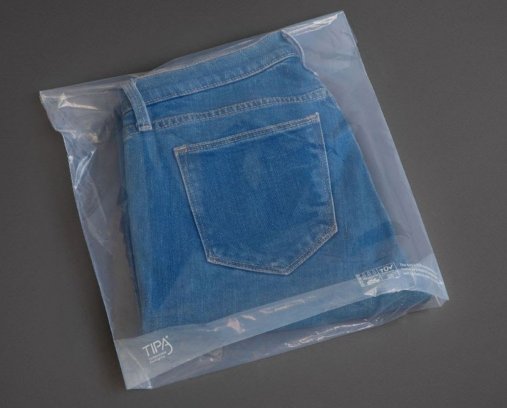
No Levi’s in Russia
Estimated 180 billion polybags are produced every year to store, transport and protect apparel and footwear.

13th December 2022
Innovation in Textiles
|
Amsterdam
Fashion for Good is launching the Home-Compostable Polybag Project to test alternatives to conventional single-use polybags.
Orchestrated in partnership with C&A and Levi Strauss, the six-month project will use novel bags from TIPA Corp. and Greenhope which are made with bio-based materials and are designed to compost in either home or municipal composting environments.
The project aims to find alternative end-of-use for landfill-bound materials and to provide an at-home option for consumers who do not have access to municipal composting programmes.
“This is an exciting opportunity to pilot a solution for an ecommerce element our customers are all too familiar with,” says Jeffrey Hogue, chief sustainability officer at Levi Strauss. “This pilot puts into practice the industry collaboration required to solve these ubiquitous challenges in the hopes of reducing harmful elements within the apparel supply chain.”
An estimated 180 billion polybags are produced every year to store, transport and protect apparel and footwear and conventional virgin polybags have a high carbon footprint and low recycling rates. They are commonly incinerated, landfilled, or subject to environmental leakage.
There are several critical challenges to scaling home-compostable bags – functionality, impact, cost and infrastructure, all of which will be assessed over the course of the project. The bags include bio-based content which must be tested against key performance and quality properties, such as transparency, durability and longevity. This project seeks to benchmark these bags against conventional plastics in supply chains, as well as measuring the overall impact and associated costs of the materials.
“Fashion is one of the main segments where consumers are looking for alternatives to conventional plastic packaging,” says Daphna Nissenbaum, CEO and Co-Founder, TIPA Corp, which is headquartered in Hod Hasharon, Israel. “A programme like this is crucial for demonstrating the viability of compostable packaging like ours, and gaining scale by forming more alliances within the industry.”
“With our technology, we are ready, willing and able to support this all the way to its positive conclusion – linking sustainable consumption and production of global brands with positive social impact among developing countries’ farmer coops who provide the bio-based raw materials,” adds Tommy Tjiptadjaja, CEO and co-founder of Jakarta, Indonesia-headquartered Greenhope.
Both TIPA and Greenhope have aligned to leading compostability certification bodies. TIPA is certified by TÜV Austria OK Compost Home, and Greenhope is undergoing certification for DIN CERTCO Home Compostable. These certifications are according to both the French standard NFT 51-800, and the Australian standard AS 5810.

Business intelligence for the fibre, textiles and apparel industries: technologies, innovations, markets, investments, trade policy, sourcing, strategy...
Find out more